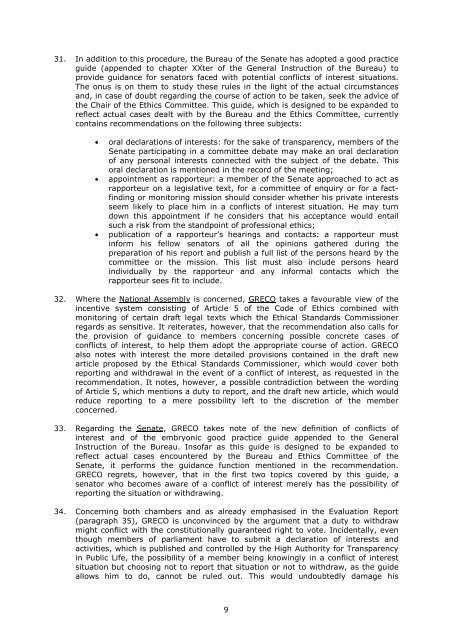F O U R T H E V A L U A T I O N R O U N D
1t62vEg
1t62vEg
Create successful ePaper yourself
Turn your PDF publications into a flip-book with our unique Google optimized e-Paper software.
31. In addition to this procedure, the Bureau of the Senate has adopted a good practice<br />
guide (appended to chapter XXter of the General Instruction of the Bureau) to<br />
provide guidance for senators faced with potential conflicts of interest situations.<br />
The onus is on them to study these rules in the light of the actual circumstances<br />
and, in case of doubt regarding the course of action to be taken, seek the advice of<br />
the Chair of the Ethics Committee. This guide, which is designed to be expanded to<br />
reflect actual cases dealt with by the Bureau and the Ethics Committee, currently<br />
contains recommendations on the following three subjects:<br />
• oral declarations of interests: for the sake of transparency, members of the<br />
Senate participating in a committee debate may make an oral declaration<br />
of any personal interests connected with the subject of the debate. This<br />
oral declaration is mentioned in the record of the meeting;<br />
• appointment as rapporteur: a member of the Senate approached to act as<br />
rapporteur on a legislative text, for a committee of enquiry or for a factfinding<br />
or monitoring mission should consider whether his private interests<br />
seem likely to place him in a conflicts of interest situation. He may turn<br />
down this appointment if he considers that his acceptance would entail<br />
such a risk from the standpoint of professional ethics;<br />
• publication of a rapporteur’s hearings and contacts: a rapporteur must<br />
inform his fellow senators of all the opinions gathered during the<br />
preparation of his report and publish a full list of the persons heard by the<br />
committee or the mission. This list must also include persons heard<br />
individually by the rapporteur and any informal contacts which the<br />
rapporteur sees fit to include.<br />
32. Where the National Assembly is concerned, GRECO takes a favourable view of the<br />
incentive system consisting of Article 5 of the Code of Ethics combined with<br />
monitoring of certain draft legal texts which the Ethical Standards Commissioner<br />
regards as sensitive. It reiterates, however, that the recommendation also calls for<br />
the provision of guidance to members concerning possible concrete cases of<br />
conflicts of interest, to help them adopt the appropriate course of action. GRECO<br />
also notes with interest the more detailed provisions contained in the draft new<br />
article proposed by the Ethical Standards Commissioner, which would cover both<br />
reporting and withdrawal in the event of a conflict of interest, as requested in the<br />
recommendation. It notes, however, a possible contradiction between the wording<br />
of Article 5, which mentions a duty to report, and the draft new article, which would<br />
reduce reporting to a mere possibility left to the discretion of the member<br />
concerned.<br />
33. Regarding the Senate, GRECO takes note of the new definition of conflicts of<br />
interest and of the embryonic good practice guide appended to the General<br />
Instruction of the Bureau. Insofar as this guide is designed to be expanded to<br />
reflect actual cases encountered by the Bureau and Ethics Committee of the<br />
Senate, it performs the guidance function mentioned in the recommendation.<br />
GRECO regrets, however, that in the first two topics covered by this guide, a<br />
senator who becomes aware of a conflict of interest merely has the possibility of<br />
reporting the situation or withdrawing.<br />
34. Concerning both chambers and as already emphasised in the Evaluation Report<br />
(paragraph 35), GRECO is unconvinced by the argument that a duty to withdraw<br />
might conflict with the constitutionally guaranteed right to vote. Incidentally, even<br />
though members of parliament have to submit a declaration of interests and<br />
activities, which is published and controlled by the High Authority for Transparency<br />
in Public Life, the possibility of a member being knowingly in a conflict of interest<br />
situation but choosing not to report that situation or not to withdraw, as the guide<br />
allows him to do, cannot be ruled out. This would undoubtedly damage his<br />
9


